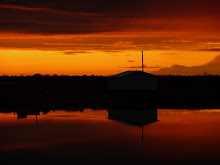Essential Question: How is everything connected from the perspectives of indigenous peoples and Western scientists? What are the advantages to knowing both ways?
Both perspectives have many things in common. The main similarity that I see, is that both perspectives study the world around them to better understand. One is to broaden understanding in general, the other, originally, to survive. The Western viewpoint is much more methodical and clinical. The indigenous viewpoint is more flexible and fluid. Both take what is observed and use it to better understand the world.
Both approach this from different directions. In the Traditional, everything is important. Earth, sky and everything in between is important. Knowing the overall picture is paramount to survival. Not having a working knowledge of weather patterns, animal behavior, plant development, and natural forces would have been a death sentence. The Big Picture is more important than any one part. Each part, a key piece of the survival puzzle.
The Western approach has had the luxury of taking a small part and studying it exclusively. Each aspect of study is divided into its own field. Some scientists choose to study a small part of a specialized science, with little thought of how it fits with other areas of study. A botanist cares little about what an astrologer finds in the stars and visa versa.
The advantage of knowing both schools of thought is a greater chance of learning more than by studying one alone. Limiting ourselves to one perspective is just that, limiting. Each perspective has a wealth of knowledge to benefit from.
A quick, slightly related, side note thought:
The Western viewpoint of the modern person, I believe, is more likely to be compartmentalized. Work is work, home is home, fun is fun, and nature is nature, all different, separate things. We rarely see any of these things as connected. In the traditional perspective, things are more interconnected. If work goes badly, one does not eat, or goes cold. Most modern “western” people do not see the different parts of their lives as a connected whole, where as a more traditional view does see these things as connected.
This wasn’t always so. It is something that has been lost to most the last few hundred years or so as we move more and more away from an agricultural country to an industrial. Growing up a farm I know how dependant people are on the natural world whether they know it or not. We have been lucky, for the most part that we live in a country that has been able to provide for our needs. Yes, there has been years of drought and flood but never has it been to the total devastation of our country (the Dust Bowl being the closest we have come and, thankfully, our grandparents eventually overcame). The slack is picked up by other parts of an area or region. Do we realize how dependent we are on the natural world?
Subscribe to:
Post Comments (Atom)


No comments:
Post a Comment